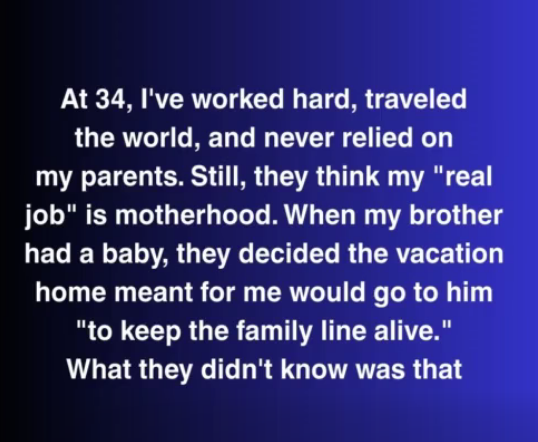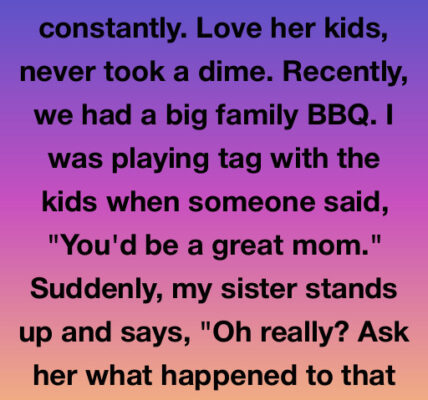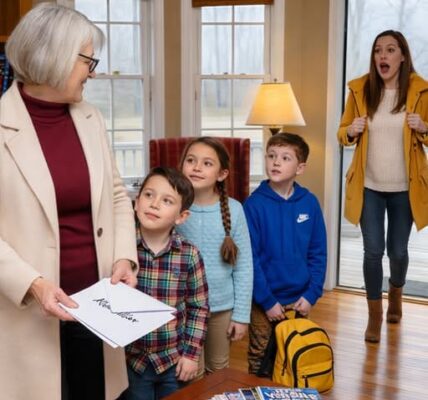At 34, I’ve worked hard, traveled the world, and never relied on my parents. Still, they think my “real job” is motherhood. When my brother had a baby, they decided the vacation home meant for me would go to him “to keep the family line alive.” What they didn’t know was that I’d been quietly preparing for that moment for years.
It started when I was fifteen. I overheard my dad once, murmuring to my uncle that he “wasn’t sure about Nira,” that I was “too independent, not soft enough.” That stuck with me. I wasn’t trying to rebel. I just saw life differently. While other kids were dreaming of their wedding days, I was sketching out how I’d run my own tour company. I loved people. Loved stories. And I knew early on that motherhood wasn’t something I had to do just to feel valid.
So I worked. Hard.
“You’ll settle down eventually,” my mom would sigh over FaceTime, her eyes drifting behind me, searching for a man, a crib, anything reassuring. “It’s just a phase.”
No matter how many times I tried to explain that my life was full—rich, even—they looked at me like I was wandering aimlessly through a maze I didn’t know I was in.
Then my younger brother Ishan had a baby with his wife Mira. Don’t get me wrong, I love being an aunt. Mira’s great, and their baby, Aarav, is a sweetheart. But that’s when the family dynamic shifted. My parents, who once fretted over Ishan’s career hops and video game addiction, now viewed him as the torchbearer.
And out of nowhere, the beach house came up.
It was a modest but charming place in Kodaikanal, tucked into the hillside, with misty mornings and jasmine blooming outside the windows. It had belonged to my grandparents, and for years, the unspoken plan was that it’d be mine one day. I’d spent summers there journaling, painting, dreaming.
But over dinner one night, just days after Aarav was born, my mom casually announced, “We’ve decided the Kodaikanal house will go to Ishan. For Aarav. It just makes more sense to keep the family memories alive through the next generation.”
I didn’t react then. Not visibly. But something snapped inside me.
That night, I walked the neighborhood alone. My fists were jammed into my coat pockets. The mountain air was cold, but not colder than their words. It wasn’t about the house. It was about being erased. About years of proving my worth, only to be told—again—that womanhood without motherhood meant nothing.
What they didn’t know was that I’d already bought a place.
A few months earlier, after a particularly frustrating call with them, I’d seen a listing for a house not far from theirs—about twenty minutes away, in the same gated community they pined after for years but couldn’t afford when we were kids. I remembered how my dad used to drive us through the area, saying, “One day, maybe.”
So I made that day happen. Quietly.
It was a stretch. I had to move some funds, cancel a trip, and downsize my own apartment for a while. But I bought it. A beautiful two-story house with a wraparound balcony and garden space that caught the golden hour just right. And I didn’t tell a soul.
Until they took the Kodaikanal house away.
Once they made that announcement, I waited.
Two weeks later, my dad called, giddy. He’d heard that the house in that neighborhood—his dream neighborhood—had been sold. He was trying to figure out who bought it. “Maybe it’s a good time for us to look again,” he mused.
That’s when I dropped the hammer.
“Oh, I bought it,” I said, stirring my coffee.
The silence on the other end was glorious. I could hear his confusion. Then his voice came back, tighter, higher. “You… did?”
“Yeah,” I said, keeping it light. “Figured I should have something of my own. You know, since my womb isn’t enough to qualify me for real estate.”
That landed like a rock.
There was no response, just a mumble and a quick hang-up. I’d never spoken to him like that before. It felt both terrifying and liberating.
In the weeks that followed, I started fixing up the house. I kept it quiet, still not inviting them over. I put in a vegetable garden, hired a local artist to paint a mural on the back wall, and converted the upstairs guest room into a cozy reading nook. My friends came over. I threw a small housewarming. Ishan came too—quietly—and told me he was sorry. That he knew what they’d done wasn’t fair. That he didn’t even want the Kodaikanal house. Mira preferred the city.
That floored me.
“They didn’t even ask,” he said, shaking his head. “They just assumed we’d want it. Mom’s already talking about baby-proofing it for our ‘family trips.’”
That’s when I realized—this wasn’t about inheritance. It was about control.
They weren’t giving him the house for him. They were using him as a proxy for their own dreams.
So I made a decision.
I invited them over.
My mom was wearing her good sari. My dad had shaved. It was like they were coming to a job interview. I could tell they were nervous.
We sat on the back porch. I served tea, the way my grandmother used to.
“This house,” my dad finally said, clearing his throat. “It’s beautiful. Really… well done.”
“Thanks,” I replied. Then I looked him straight in the eye. “And I didn’t need a husband or a child to earn it.”
He flinched. My mom shifted in her seat.
I wasn’t trying to be cruel. I just needed it said. Out loud.
“I love my life,” I continued. “And I love being part of this family. But I’m not less just because I chose differently.”
There was a pause. My dad looked at the floor. My mom finally spoke.
“We didn’t mean to make you feel that way.”
“But you did,” I said gently.
She nodded. Tears welled up in her eyes. “We were scared. Scared you’d be alone. That no one would take care of you later.”
I took a deep breath. “I’ve built a life full of people. Good people. I’m not alone.”
For the first time in years, I saw them soften. Really soften.
Over the next few months, things shifted. Slowly. They started bragging to relatives about my business. My mom sent me articles about solo travel. My dad started asking questions about property taxes and offered to help with repairs.
And Ishan? He transferred the Kodaikanal house to me. Legally.
“I talked to a lawyer,” he said. “You’ve always loved that place. And I don’t want to be the reason you lose it.”
I wanted to cry. But instead, I hugged him and told him thank you. We didn’t tell our parents right away. We just let things be for a while. But when we finally did, my dad just nodded and said, “That feels right.”
Now, both houses are mine. Not out of spite. Out of self-worth.
I rent out Kodaikanal on and off, and sometimes, I take friends there for writing retreats. The house in the city? That’s my sanctuary.
I’ve never had a baby. Maybe I never will. But I’ve raised ideas. Businesses. Friendships. A sense of peace.
And that counts.
Sometimes, your family doesn’t get it until they see it. You can shout until you’re hoarse. But once they see the fruits of your joy, your choices—they begin to listen.
To anyone out there feeling unseen, unchosen, undervalued just because your path looks different—don’t fold.
Build. Thrive. Surprise them with the house they thought was out of reach.
Then invite them in, if you want. Or don’t.
You get to choose now.
If this story made you feel something, give it a like or share—it might be exactly what someone else needs to hear. 💬👇




